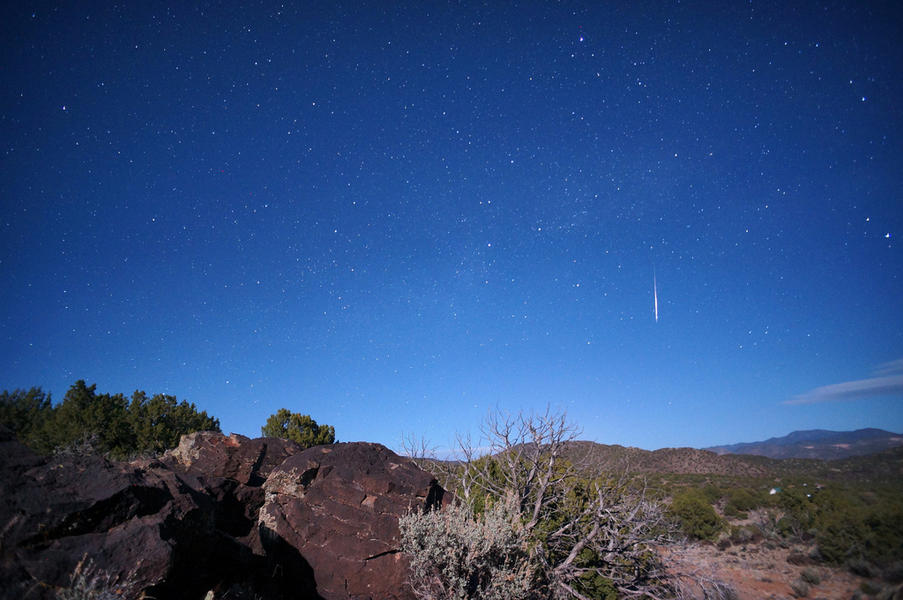The Lyrid meteors are falling tonight. Watch the shower online.
CC by: Mike Lewinski


A free daily email with the biggest news stories of the day – and the best features from TheWeek.com
You are now subscribed
Your newsletter sign-up was successful
Early Tuesday morning, from midnight until dawn, is the peak of the annual Lyrid meteor showers, not one of the major meteor showers but a nice celestial show if you have a clear sky and enjoy spending time outside in the spring night air. If you have overcast skies or prefer staying inside, NASA and Slooh have you covered — or at least they are trying. NASA is live-streaming the Lyrid meteor showers — so named because they appear to originate from the constellation Lyra the Harp — from its observatory in Huntsville, Ala.
"Clouds are moving into our area, so the 'blank grayish box' effect may persist," NASA says, somewhat sheepishly. "We'll cross our fingers for clearing skies. For your listening pleasure, that's Third Rock Radio on the Ustream feed." So there's that:
Slooh is broadcasting from the Canary Islands, where the skies appear to be clear. Astronomer Bob Berman, who's narrating Slooh's meteor show, says he expects a meteor every three to four minutes. If not, he has interesting commentary about the Lyrids, and meteors in general.
The Week
Escape your echo chamber. Get the facts behind the news, plus analysis from multiple perspectives.

Sign up for The Week's Free Newsletters
From our morning news briefing to a weekly Good News Newsletter, get the best of The Week delivered directly to your inbox.
From our morning news briefing to a weekly Good News Newsletter, get the best of The Week delivered directly to your inbox.
If you're confused about the difference between meteors and meteorites, Space.com has a helpful explainer. --Peter Weber
Meteor showers are created when pieces of space debris strike Earth's upper atmosphere. The bits of dust and rock heat up to extreme temperatures and glow, creating the streaks seen during meteor showers... When in space, bits of space material — like the debris that creates the Lyrid meteor shower — are known as meteoroids. As they streak through the atmosphere, they are called meteors and any bits of rock that make it to Earth's surface are labeled meteorites. [Space.com]
A free daily email with the biggest news stories of the day – and the best features from TheWeek.com
Peter has worked as a news and culture writer and editor at The Week since the site's launch in 2008. He covers politics, world affairs, religion and cultural currents. His journalism career began as a copy editor at a financial newswire and has included editorial positions at The New York Times Magazine, Facts on File, and Oregon State University.
-
 6 exquisite homes with vast acreage
6 exquisite homes with vast acreageFeature Featuring an off-the-grid contemporary home in New Mexico and lakefront farmhouse in Massachusetts
-
 Film reviews: ‘Wuthering Heights,’ ‘Good Luck, Have Fun, Don’t Die,’ and ‘Sirat’
Film reviews: ‘Wuthering Heights,’ ‘Good Luck, Have Fun, Don’t Die,’ and ‘Sirat’Feature An inconvenient love torments a would-be couple, a gonzo time traveler seeks to save humanity from AI, and a father’s desperate search goes deeply sideways
-
 Political cartoons for February 16
Political cartoons for February 16Cartoons Monday’s political cartoons include President's Day, a valentine from the Epstein files, and more
-
 Blue Origin launches Mars probes in NASA debut
Blue Origin launches Mars probes in NASA debutSpeed Read The New Glenn rocket is carrying small twin spacecraft toward Mars as part of NASA’s Escapade mission
-
 Dinosaurs were thriving before asteroid, study finds
Dinosaurs were thriving before asteroid, study findsSpeed Read The dinosaurs would not have gone extinct if not for the asteroid
-
 SpaceX breaks Starship losing streak in 10th test
SpaceX breaks Starship losing streak in 10th testspeed read The Starship rocket's test flight was largely successful, deploying eight dummy satellites during its hour in space
-
 Rabbits with 'horns' sighted across Colorado
Rabbits with 'horns' sighted across Coloradospeed read These creatures are infected with the 'mostly harmless' Shope papilloma virus
-
 Lithium shows promise in Alzheimer's study
Lithium shows promise in Alzheimer's studySpeed Read Potential new treatments could use small amounts of the common metal
-
 Scientists discover cause of massive sea star die-off
Scientists discover cause of massive sea star die-offSpeed Read A bacteria related to cholera has been found responsible for the deaths of more than 5 billion sea stars
-
 'Thriving' ecosystem found 30,000 feet undersea
'Thriving' ecosystem found 30,000 feet underseaSpeed Read Researchers discovered communities of creatures living in frigid, pitch-black waters under high pressure
-
 New York plans first nuclear plant in 36 years
New York plans first nuclear plant in 36 yearsSpeed Read The plant, to be constructed somewhere in upstate New York, will produce enough energy to power a million homes
